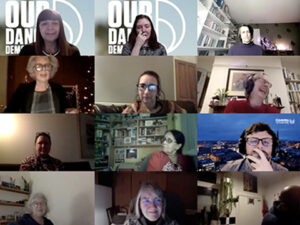
As I contemplate and celebrate IWD this year I was so grateful to have been able to create an event at a time when we have all managed and negotiated such change in our lives through living in a Pandemic, adhering to lockdown measures and basically surviving as best we can. At a time when its felt that art and culture was sidelined with venues closed, live events cancelled and constantly postponing projects it was wonderful to work with Dr. Sarah Black- Frizell and produce Our Dance Democracy 2 (ODD2) conference in February 2021. It was not a surprise that the majority of our speakers, contributors and performers were women, local, national and international women who have a real sense of how the world is working for them, negotiating change with a real sense of humanity and care. We had some very insightful men also, but it being IWD 2021 on 8th March and its theme #ChoosetoChallenge I thought this a great opportunity to celebrate and shine a light on some extraordinary female and non-binary identifying thinkers and creators that contributed to the event and I wanted to celebrate what they are achieving through their practice.
Here is just a snippet of what took place at ODD2 on 11th and 12th February 2021, compiled by Dr. Sarah Black -Frizell
Day 2 of the conference offered a strong artist voice that began with the film RED, see news section on this site: https://www.karengallagherandassociates.co.uk/international-womens-day
The wonderful choreographer, dancer and writer Alexandrina Hemsley (YEWANDE 103) created a beautiful reflection in relation to enacting agency and finding a space between, where we consider shelter and a call to healing. Her thoughts resonated the whole day.
This was followed by a filmed conversation below: The Body and Pandemic, Liz Lea, Tammi Gissell and Hanna Cormick
Drawing on 70 years of combined arts practice working across Australia and the world these leading artists discuss how boundaries and displacement have impacted their lives and practice. The talk will draw on lived experience of disability, chronic illness, displacement giving rise to creativity. Hanna’s call to consider that we don’t just return to ‘normal’ but engage in a new way of connecting as we find ways to present live and online in equal measure.
Dr. Sarah Black-Frizell brought together a group of artists and academics who have been in an ongoing dialogue as part of Domestic Spaces and come together to share the ways they have adapted and developed their existing arts making practice and research methodologies during Covid-19 and ensuing Global Lockdowns. One of those works is shared below. “B.O.D.Y. is an intimate exploration of the domestic space following Melbourne’s lockdowns, from my point of view as an expat and a temporary resident in Australia. The COVID emergency redefined body-space relationships and ideas of belonging, mobility, and migration. What can I, or cannot, call “home” and why?
B.O.D.Y. The Bureau of Domestic Yearning is a series of performances for the camera resulting in photography and video documentation. This project has been realised as part of “Domestic Spaces”, an international project curated by Dr Sarah Black-Frizell (Liverpool Hope University, UK) on performances created at home during the pandemic. Photos have been taken at my current place in Naarm (Melbourne, AUS) in collaboration with Sabrina Talarico in October 2020″.© Angela Viora
Although not presented in the conference I asked Sarah to share some of her practice that she had be deliberating and creating over the last few years and very much informs Domestic Spaces. Watch Trace (2016) below:
“Trace is an older piece of work, and sharing this is a moment of reflection. In my research I establish the home as a place where performance can happen. I work on a mother’s timetable; when the children are asleep, are at school, whilst daily life happens, and at the same time these daily occurrences have prevented me from working. I developed a curatorial sense of caring and responsibility for my children, family and art practice in a relational and ethical way. Trace is a dance film and photographic enquiry”. Dr. Sarah Black Frizell. Film/photography – Wes Storey Music Andy Frizell
One of the many highlights of the event was a sharing of practice by Patricia Carolin Mai, Yinka Graves and melissandre varin, who is non-binary. All working from what would appear to be very different perspectives but as they shared their practice and processes, they came together in conversation with such connectivity and similarity in thought and action. What I took from their work was how they were all negotiating who they are through what they produce, all considering transformation on some level, physical and emotional, talking about the importance of identity from their perspective, and ensuring authenticity. Transforming who they are: Body as an archive; transitioning, taking care and reinterpreting through care and resistance. Below is as short version of KONTROL (Patricia Carolin Mai) and Disappearing Act (Yinka Graves) and of flour and Earth 1/3 (melissandre varin).
Huge thanks to all the wonderful creative thinkers and makers – let us all never stop choosing to challenge!
For further information regarding Our Dance Democracy check out the page on this site: https://www.karengallagherandassociates.co.uk/odd-2
